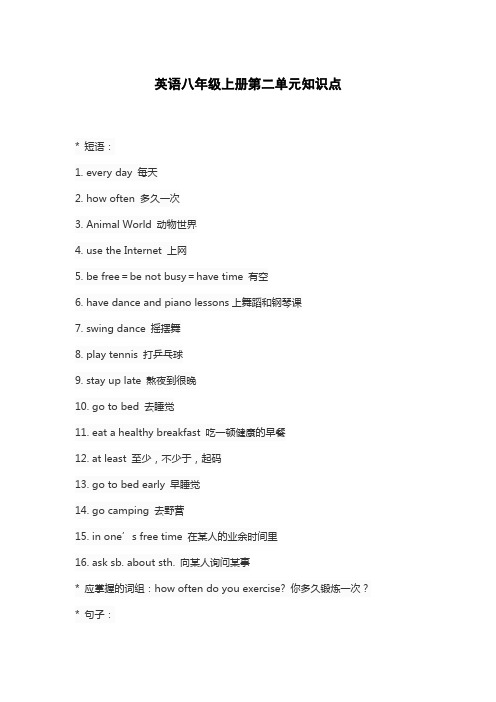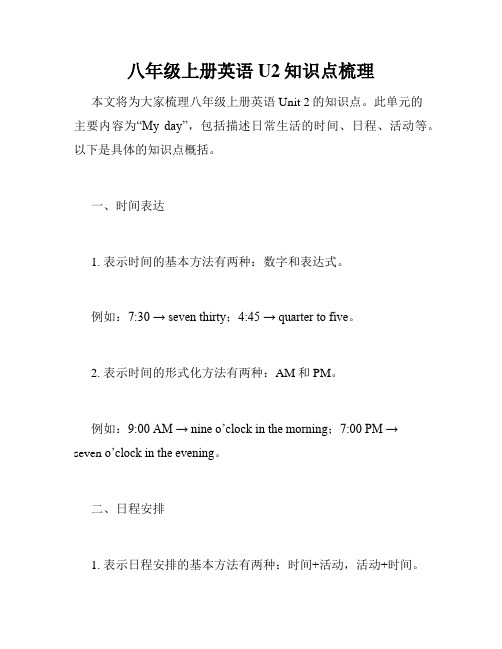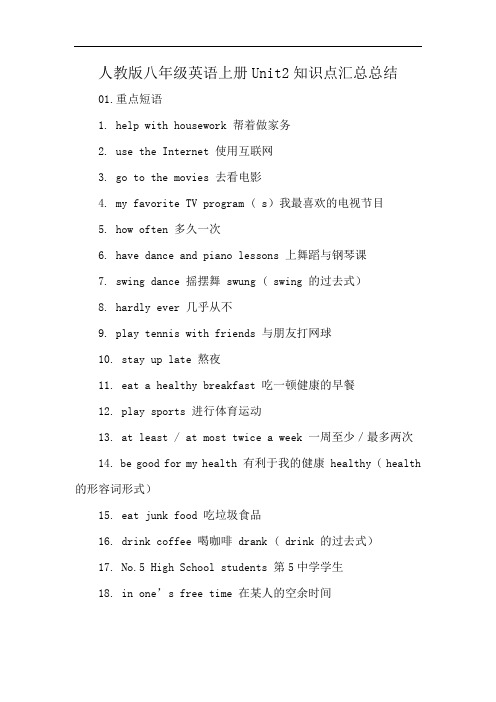八年级英语上册:Unit2知识点归纳
八年级英语上册“Unit 2”必背知识点

八年级英语上册Unit 2 How often do you exercie?必背知识点一、词汇短语1. help with housework:帮助做家务2. go shopping:购物3. on weekends/at weekends:在周末4. how often:多久一次5. hardly ever:几乎不6. once a week/month:每周/月一次7. twice a week/month:每周/月两次8. go to the movies:去看电影9. every day:每天10. use the internet:上网/用网11. be free:有空12. have dance and piano lessons:上舞蹈和钢琴课13. swing dance:摇摆舞14. play tennis:打网球15. stay up late:熬夜16. at least:至少17. go to bed early:早睡18. play sports:锻炼身体19. be good for:对……有好处20. go camping:去野营21. in one’s free time:在某人的空闲时间22. not…at all:根本不23. the most popular:最流行24. such as:例如25. go to the dentist:去看牙医26. old habits die hard:旧习惯难改27. less than:少于/不到二、语法结构1. 频率副词:always, usually, often, sometimes, never 等,用于描述动作发生的频率。
2. “次数”的表达方法:一次once,两次twice,三次或三次以上用基数词+times,如three times,five times。
3. how often 引导的特殊疑问句:用于询问动作发生的频率,回答常含有频率词组或短语。
英语八年级上册第二单元知识点

英语八年级上册第二单元知识点* 短语:1. every day 每天2. how often 多久一次3. Animal World 动物世界4. use the Internet 上网5. be free=be not busy=have time 有空6. have dance and piano lessons上舞蹈和钢琴课7. swing dance 摇摆舞8. play tennis 打乒乓球9. stay up late 熬夜到很晚10. go to bed 去睡觉11. eat a healthy breakfast 吃一顿健康的早餐12. at least 至少,不少于,起码13. go to bed early 早睡觉14. go camping 去野营15. in one’s free time 在某人的业余时间里16. ask sb. about sth. 向某人询问某事* 应掌握的词组:how often do you exercise? 你多久锻炼一次?* 句子:1. Do you have enough time to practice the piano every day? 你每天有足够的时间练钢琴吗?2. How often do you watch Animal World? 你多久看一次《动物世界》?3. I usually use the Internet to search for information about science. 我通常上网搜索科学方面的信息。
4. I am always free on weekends. 我总是在周末有空。
5. My sister has dance and piano lessons every day. 我妹妹每天上舞蹈课和钢琴课。
6. Last weekend, we went to a swing dance club and had a great time. 上周末,我们去了一个摇摆舞俱乐部,玩得很开心。
八年级上册英语U2知识点梳理

八年级上册英语U2知识点梳理本文将为大家梳理八年级上册英语Unit 2的知识点。
此单元的主要内容为“My day”,包括描述日常生活的时间、日程、活动等。
以下是具体的知识点概括。
一、时间表达1. 表示时间的基本方法有两种:数字和表达式。
例如:7:30 → seven thirty;4:45 → quarter to five。
2. 表示时间的形式化方法有两种:AM和PM。
例如:9:00 AM → nine o’clock in the morning;7:00 PM → seven o’clock in the evening。
二、日程安排1. 表示日程安排的基本方法有两种:时间+活动,活动+时间。
例如:6:00 AM → get up;7:00 AM → have breakfast。
2. 表示日程安排的常见活动包括:get up、havebreakfast/lunch/dinner、go to school/bed、have classes、have a break、do homework、watch TV、play sports/games/music、go shopping、have a party。
三、常用语句1. 询问时间:What time is it? What’s the time? Do you have the time?2. 描述日程安排:What’s your plan for today/tomorrow? What do you usually do on weekends?3. 提供建议:You’d better go to bed early tonight. You should do more exercise.四、疑问句1. 一般疑问句:肯定回答用“Yes,主语+助动词”;否定回答用“No,主语+助动词+not”。
例如:Do you usually wake up at 6:30 AM? Yes,I do. / No,I don’t.2. 特殊疑问句:用来询问具体事实,通常以疑问词开头。
人教八年级英语上册第2单元知识点总结归纳

人教八年级英语上册第2单元知识点总结归纳Unit2 How often do you exercise?【重点语法】1.频率副词: always, usually, often, sometimes, never频率副词在句中通常放在实义动词之前, be动词或助动词之后。
常用于一般现在时态中。
2.“次数”的表达方法一次once,两次twice,三次或三次以上:基数词+ times,如:three times,five times,3. how often“多久一次”问频率,回答常含有频率词组或短语。
常见的how疑问词:1)How soon多久(以后)—How soon will he be back?他多久能回来?—He will be back in a month.他一个月后能回来。
2)how long“多久”—How long did it take you to clean the house?你打扫房子用了多久?—It took me half an hour to clean the house.我打扫这房子用了半小时。
3)How many+名复How much+不可名“多少”问数量(how much还可问价格)【重点短语】1. go to the XXX去看电影2. look after = take care of照顾3. surf the internet上网4. XXX健康的生活方式5. go XXX去划板6. keep XXX保持健康7. eating habits饮食气8. XXX exercise做更多的活动9. the same as与甚么不异10. be different from分歧11. once a month一月一次12. XXX一周两次14. most of the students=most students15. shop=go shopping=do some shopping购物18. come home from school放学回家19. of course = certainly = sure当然20. get good grades取得好成绩21. keep/be in good health坚持安康22. take a XXX去度假【词语辨析】1. maybe / may bemaybe是副词,意为“大约,大概,也许”,普通用于句首。
初中英语人教新目标八年级上册Unit2知识点整理

八年级英语上册Unit2知识点一、词汇与短语【重点单词】[A部分]1.housework n.家务劳动;家务事2.hardly adv.几乎不;几乎没有3.ever adv.在任何时候;从来;曾4.once adv. 一次;曾经5.twice adv.两次;两倍6.Internet n.(国际)互联网;因特网7.program n.节目8.full adj.忙的;满的;充满9.swing n.摆动;秋千 V. (使)摆动;摇摆10.maybe adv.大概;或许;可能11.least adv.最小;最少 adj. & pron.最小的;最少的[B部分]1.junk n.无用的东西;无价值的东西2.health n.健康;人的身体(或精神)状态3.result n.结果;后果4.percent n.百分之…5.online adj. & adp.在线(的);联网(的)6.although conj.虽然;尽管;即使7.through prep.以;凭借;穿过8.such adj. &pron.这样的;那样的;类似的9.mind n.头脑;心智10.together adv.在一起;共同11.die v.消失;灭亡;死亡12.dentist n.牙科医生13.magazine n.杂志;期刊14.however adv.然而;不过15.almost adv.几乎;差不多16.none pron.没有一个;毫无17.point n.得分;点 v.指;指向【重点短语】[A部分]1.how often 多久一次2.help with housework 帮助做家务3.hardly ever几乎从不4.on weekends 在周末5.once a week 每周一次6.twice a month 每月两次7.be free 有空8.go to the movies 去看电影e the Internet 用互联网10.have dance and piano lessons上舞蹈课和钢琴课11.swing dance 摇摆舞12.play tennis 打网球13.stay up late 熬夜;睡得很晚14.at least 至少;不少于;起码15.play sports 进行体育活动[B部分]1.junk food垃圾食品2.be good for 对…有好处3.go camping 去野营4.not … at all 一点儿也不5.go online 上网6.in one's free time 在某人的业余时间7.the best way to do sth. 做某事的最好方式8.such as例如;像这样9.more than 多于10.less than 少于【重点句子】[A部分]1.--What do you usually do on weekends?--I often go to the movies."在周末你通常做什么?”“我经常去看电影。
人教版八年级英语上册Unit2知识点汇总总结

人教版八年级英语上册Unit2知识点汇总总结01.重点短语1. help with housework 帮着做家务2. use the Internet 使用互联网3. go to the movies 去看电影4. my favorite TV program ( s)我最喜欢的电视节目5. how often 多久一次6. have dance and piano lessons 上舞蹈与钢琴课7. swing dance 摇摆舞 swung ( swing 的过去式)8. hardly ever 几乎从不9. play tennis with friends 与朋友打网球10. stay up late 熬夜11. eat a healthy breakfast 吃一顿健康的早餐12. play sports 进行体育运动13. at least / at most twice a week 一周至少/最多两次14. be good for my health 有利于我的健康 healthy ( health 的形容词形式)15. eat junk food 吃垃圾食品16. drink coffee 喝咖啡 drank ( drink 的过去式)17. No.5 High School students 第5中学学生18. in one’s free time 在某人的空余时间19. ask them about their free time activities 询问他们关于他们的业余活动20. not … at all 根本不…21. go online 上网22. be surprised that ..感到惊讶23. use it for fun 为了取乐而使用它24. the answers to the questions 这些问题的答案25. one to three times a week 一周一到三次26. two percent of the students 2%的学生27. the best way to do sth.做某事的最好方式28. such as 例如29. spend time with your friends 与你的朋友共度时光spent ( spend 的过去式)30. spend time on sth./ in doing sth.花时间在某事上/做某事31. play together 一起玩32. watch TV for over 2 hours 看两个多小时电视33. go to the dentist 去看牙医34. a 16-year-old high school student 一名16岁的中学生35. have a lot of good habits 有许多好习惯36. more / less than two hours 多/少于两小时37. go to the dentist for teeth cleaning 去牙医处清洁牙齿38. go to the shopping center 去购物中心02.重点句子语法聚焦1. --What do you usually do on weekends?你在周末通常做什么?--I always exercise.我总是锻炼。
八年级英语上册Unit-2-How-often-do-you-exercise知识点归纳

八年级英语上册Unit 2 How often do you exercise知识点归纳八年级英语上册Unit 2 How often do you exercise知识点归纳一、词组、短语:1、help with housework 帮助做家务活,2、go shopping 购物,3、on weekends 在周末,4、how often 多久一次,5、hardly ever几乎不,6、once a week 每周一次,7、twice a month每月二次,8、go to the movies去看电影,9、every day 每天,10、use the Internet上网/用网,11、be free有空,12、have dance and piano lessons 上舞蹈钢琴课,13、swing dance摇摆舞14、play tennis 打网球,15、stay up late熬夜,16、at least至少,17、go to bed early 早睡,18、 play sports 锻炼身体,19、be good for 对…有好处,20、go camping去野营,21、in one’s free time 在某人的空闲时间,22、not….at all 根本不,23、the most popular 最流行,24、such as例如,25、go to the dentist去看牙医,26、more than 超过/多于,27、Old habits die hard.旧习惯难改。
28、 hard=difficult 困难的,29、less than 少于/不到二、重要句子(语法):What do you usually do on weekends你周末通常做什么 I always exercise.总是锻炼身体。
What do they do on weekends他们周末干什么 They often help with housework.他们经常帮助干家务活。
八年级上册英语u2知识点总结

八年级上册英语u2知识点总结Unit 2主要介绍了一些形容词和副词的用法,以及一些语法知识。
下面是本单元的知识点总结:一、形容词和副词的用法1.形容词形容词用于描述名词或代词的属性。
一般放在名词前面,例如:a tall boy(一个高个子男孩)。
2.副词副词用于描述动词、形容词、副词的程度或方式。
一般放在动词后面,例如:He walks slowly.(他走得慢慢的。
)二、比较级和最高级1.比较级比较级用于描述两个事物之间的比较,形容词和副词的比较级通常在单词末尾加“-er”,例如:taller(更高的),more carefully (更小心地)。
2.最高级最高级通常用于描述三个或三个以上的事物之间的比较,形容词和副词的最高级通常在单词末尾加“-est”,例如:tallest(最高的),most carefully(最小心地)。
三、祈使句祈使句表示请求、命令、建议、劝告等含义。
祈使句一般省略主语,动词用原形。
例如:Open the door.(开门。
)四、情态动词情态动词用于表示说话人的态度、愿望、建议、可能性等,常见的情态动词有:can、could、may、might、must、should、would 等。
例如:I should study harder.(我应该更努力学习。
)五、被动语态被动语态用于表示动作的承受者或者是动作的发生者不明确。
被动语态由助动词be+动词的过去分词构成,例如:The window was broken by the wind.(窗户被风摔碎了。
)六、虚拟语气虚拟语气用于表示非真实的情况,常见的虚拟语气有:与现在事实相反的虚拟语气、与过去事实相反的虚拟语气、与将来事实相反的虚拟语气等。
例如:If I were you, I would go to bed early.(如果我是你,我会早点睡觉。
)七、定语从句定语从句用于对一个名词或代词进行修饰。
定语从句通常由关系代词who、whom、whose、which、that引导。
- 1、下载文档前请自行甄别文档内容的完整性,平台不提供额外的编辑、内容补充、找答案等附加服务。
- 2、"仅部分预览"的文档,不可在线预览部分如存在完整性等问题,可反馈申请退款(可完整预览的文档不适用该条件!)。
- 3、如文档侵犯您的权益,请联系客服反馈,我们会尽快为您处理(人工客服工作时间:9:00-18:30)。
8上Unit2知识点归纳
一、短语
1.比人聪明cleverer than people
2.更少的广告fewer advertisements
3.学校什么样?What’s school like?
4.玩具卡车a toy lorry/truck
5.英式英语British English
6.美式英语American English
7.给我的表兄买个足球buy a football for my cousin=buy my cousin a football
8.一块橡皮an erasr/a rubber
9.练习踢足球practise playing fo otball
10.在八年级in Year8=in Grade8=in the8th grade
11.一所混合学校a mixed school
12.在我的所有学科中among all my subjects
13.读书周a Reading Weeking
14.在读书周期间during the Reading Weeking
15.读更多的书read more books
16.临近这周结束时near the end of the week
17.在这周结束的时候at the end of the week
18.与某人讨论某事discuss sth with sb
19.与我的同学讨论这些书discuss the books with my classmates
20.在课堂上in class
21.上课have lessons=have classes=have a lesson=have a class
22.学习外语learn foreign languages
23.似乎开心seem happy=seem to be happy
24.似乎要做某事seem to do sth
25.似乎走的更快seem to go faster
26.对学校更多的了解learn more about the school
27.帮助某人做某事help sb with/do sth
28.认真倾听我的难题listen carefully to my problems
29.主动给我帮助offer me help=offer help to me
30.在星期五下午on Friday afternoon
31.结束比往常早en d earlier than usual
32.一起做运动do sports together
33.每次every time
34.上个月last month
35.打棒球play baseball
36.在我们三个中among the three of us
37.其他任何一个学生any other student
38.我的其他任何一个同学any other of my classmates
39.我的所有其他同学all my other classmates
40.其他的学生the other students
41.学生的数量the number of students
42.穿校服wear uniforms
43.做早操do morning exercises
44.放八个星期假have8weeks off
45.花两个小时做家庭作业spend2hours on homework=spend2hours doing homework
46.英国学校的生活life in a British school
47.另外半个小时another half an hour
48.下象棋play chess
49.最多,至多at most
50.阅读do some reding
51.位于第一come first
52.进行英语测试have an English test
53.浏览问题look through the questions
54.读的非常慢read very slowly
55.首先,一开始at first
56.坚持做某事keep doing
57.坚持用英语写作keep writing in English
58.我的日常生活my daily life
59.学习使用英语learn to use English
60.通过这种方式(in)this way
61.在周at/on weekends=at/on the weekend
62.玩的开心have a lovely time
63.进行每个学科的月考have a monthly test on each subj ect
64.美术俱乐部Art Club
65.进行学校旅行go on a school trip
66.需要早起need to get up early
67.有一个小时的作业have an hour of homework
68.有许多时间做课外活动have lots of time for after-school activities
69.一个又大又干净的食堂a big clean dining hall.
70.听音乐listen to music
71.戴领带wear ties
72.在每个班in each class
73.选课学习choose subjects to study
74.上电脑课have computer lessons
75.足球场a football field
76.游泳池a swimming pool
77.玩的开心,过得愉快have fun
78.我的理想学校my ideal school
二、句型
1.We’re cleverer than people.
2.There are fewer advertisements.
3.They have to worker harder.
4.Boys and girls have lessons together.
5.Among all my subjects,I like French best.
6.Learning foreign languages is fun.
7.I often read more books than my classmates.
8.Time seems to go faster when we are reading interesting books.
9.On Friday afternoon,our school ends earlier than usual.
10.Our team won two games last month.
11.Kitty has the most eggs.
12.She ran faster than Millie.
13.Amy came first in the race.She ran the fastest.
14.Sunshine Middle School has the most teachers and students of the three.
15.Chinese students have more weeks off for the summer holiday than British students.
16.British students spend less time doing homework than Chinese students.
17.Among the three schools,American students spend the least time on homework.
18.They work the hardest.
19.I have only half an hour for my hobbies at most.
20.To me,learning foreign langages is really f un.
21.We have lots of time for after-school activities.
22.We only have an hour of homework every day.
三、语法
1.数量的比较
(1)more表示更多,即可指可数名词也可指不可数名词。
例:Millie has more tomatoes than Daniel.
(2)fewer表示更少,指可数名词(复数)
例:Millie has fewer bananas than Kitty.
(3)less表示更少,指不可数名词
例:Millie has less rice than Daniel.
(4)fewest表示最少,指可数名词(复数)
例:Daniel has the fewest tomatoes of the three.
(5)least表示最少,指不可数名词
例:Millie has the least juice among the students.
2.副词的比较,与上一单元的用法一致。
3.形容词与副词
(1)形容词修饰名词(指人或者物);副词修饰动词/形容词。
(2)形容词变为副词,一般只要在形容词后加上ly;以y结尾的,把y变成i再加ly.例:careful-carefully strong-strongly
quick=quickly heavy-heavily
slow-slowly happy-happily
usual-usually easy-easily。
